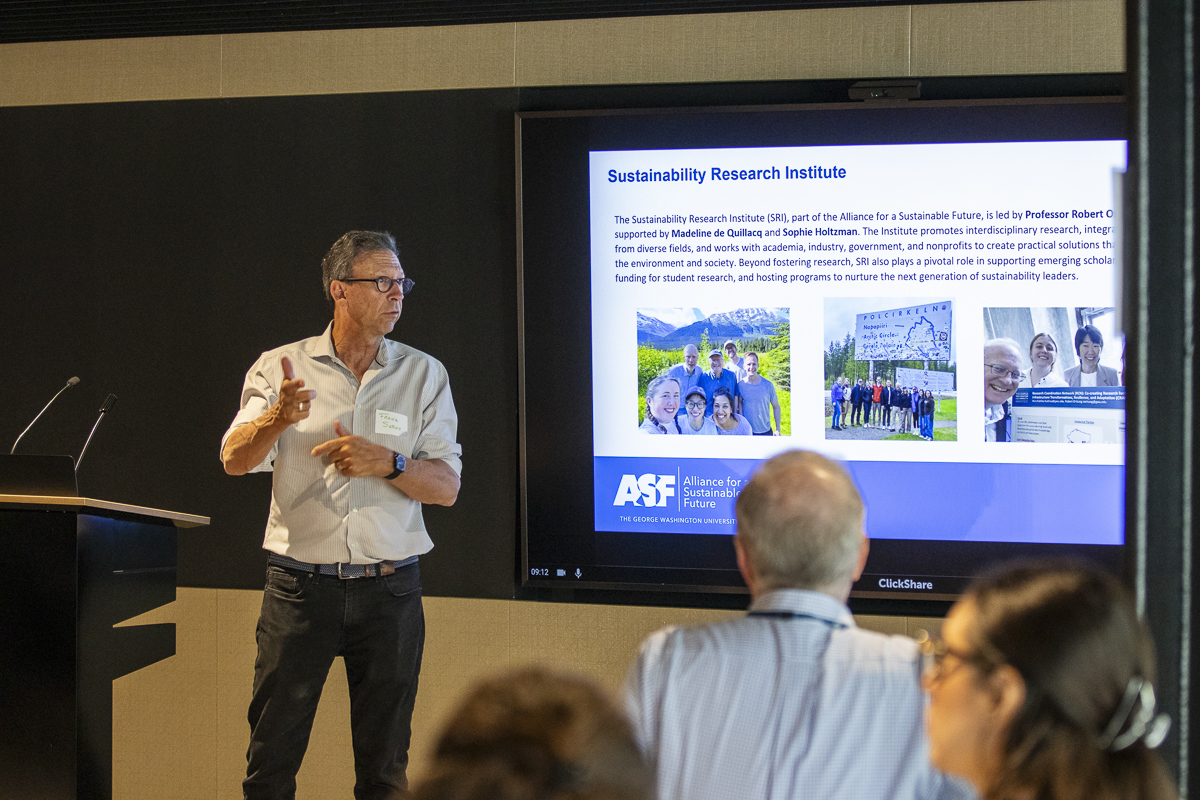This fall, colleges and universities across the country are entering a new semester marked by uncertainty. Faculty and researchers who have built careers tackling global challenges now face instability in existing grants and future funding opportunities. According to a recent report from the Association of American Universities (AAU), member institutions are experiencing a 10–25% decline in federal research funding compared to 2024.
In light of these challenges, how can researchers build interdisciplinary communities to overcome funding gaps and strengthen support systems?
That’s the question faculty and experts at the George Washington University are working to answer. The Sustainability Research Sandbox, organized and co-hosted by the Sustainability Research Institute (SRI) and the GW Alliance for a Sustainable Future (ASF)—in partnership with the Global Food Institute (GFI) and the Research and Engagement for Action on Climate and Health (REACH) Center—brought together experts and researchers to explore new funding pathways and identify potential collaborators for interdisciplinary projects.

SRI Director Robert Orttung opened the workshop with a call to action, encouraging the more than 30 attendees to connect with colleagues outside their usual circles. Participants included experts from external universities, GW institutes and centers, and faculty across seven GW schools, representing a wide range of disciplines.
“We each bring different types of knowledge to the table. Sustainability challenges are complex and individuals can make progress on their own, but real impact happens when we collaborate across disciplines. Bringing together people from different backgrounds like systems engineers, food policy experts, communications specialists, and others allows us to attack a problem from multiple angles,” said Orttung. “We often operate in our own bubbles, so taking a morning to connect, share ideas, and learn what others are working on broadens our perspective. Hearing what’s top of mind for others helps you reflect differently on your own research.”
Throughout the morning, the interdisciplinary working groups brainstormed ideas ranging from healthy food access and supply chain innovations, to mining-related contamination and climate-induced migration, among other topics. These ideas were captured on large posters and shared during a gallery walk, where participants voted on the most promising concepts for future collaboration.
“Working groups like this create the spark for new partnerships and fresh ideas,” said GFI’s Director of Policy and Programs, Priya Fielding-Singh. “The energy in the room showed how much people want to collaborate, and this interactive session highlighted the unique convening power of GFI, SRI and the REACH Center at GW.”

By the end of the workshop, more than ten promising ideas were pitched, refined, and voted on by the interdisciplinary working groups. Orttung and representatives from the organizing institutes encouraged continued collaboration and provided guidance on strategies to advance the projects. As a next step for workshop participants, SRI, GFI and the REACH Center committed to supporting the proposed projects through individual outreach and development with the working groups, curated lists for potential funding, and the possibility of seed grants to get the work off the ground.
“We want to make sure these ideas are realized. We want to help you build the team, and find the resources to make this happen,” Orttung said in closing remarks.


